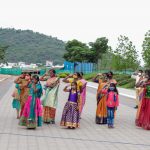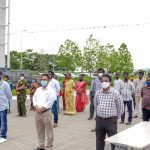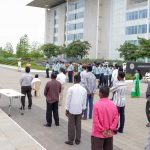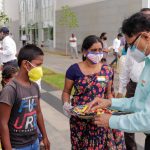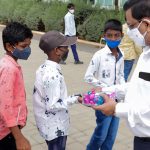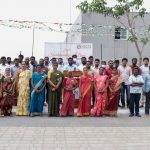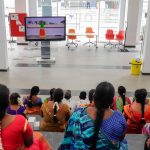Students underpinned by CR&CS secure jobs in Bajaj Finserv Ltd.
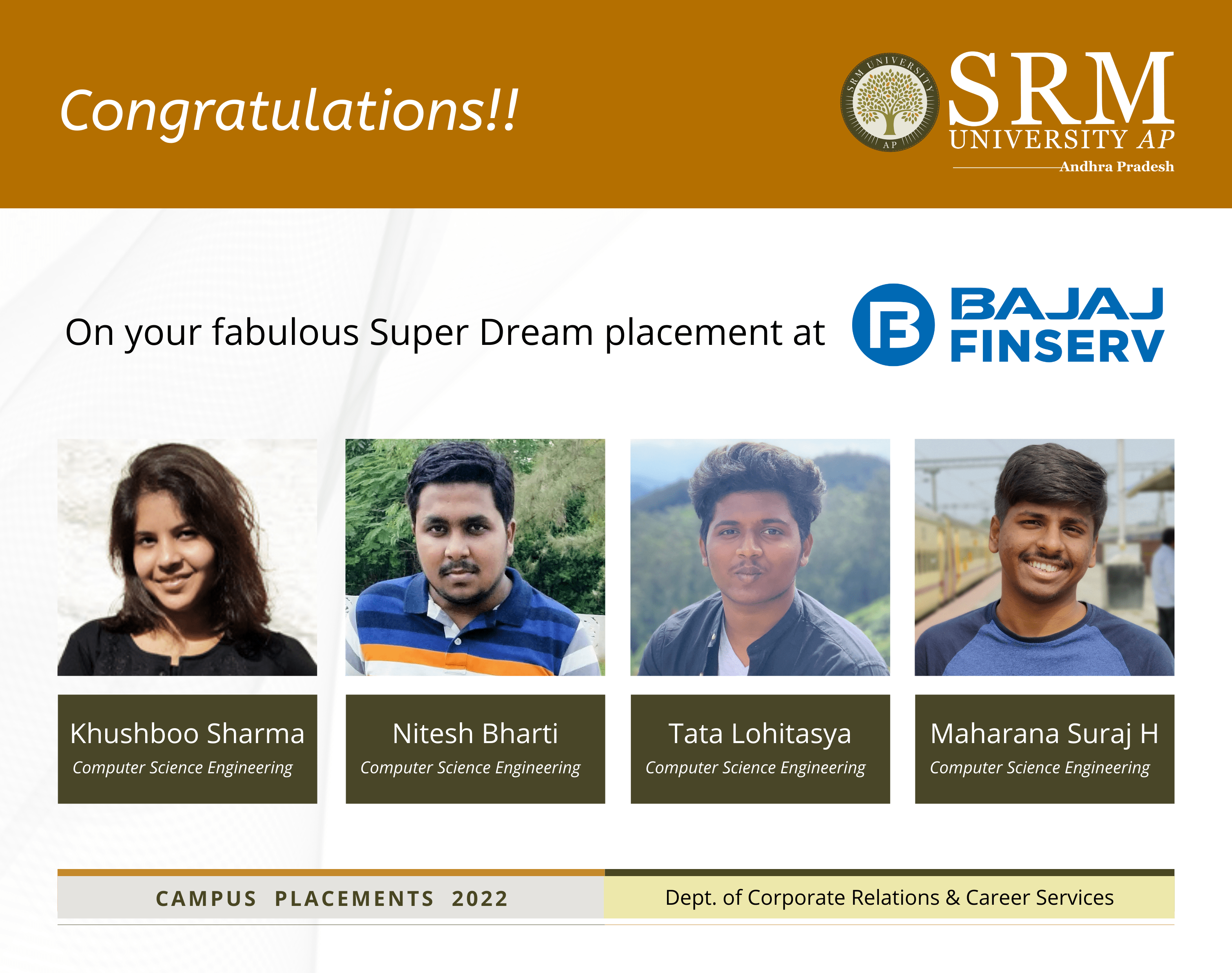 Maharana Suraj Harihar, Nitesh Bharti, Tata Lohitasya, Khushboo Sharma are four undergraduates from the Department of Computer Science and Engineering who have got placed with the financial services company Bajaj Finserv Ltd. in the Engineering Campus placements for the class of 2022. They will be working in the headquarters of the company in Pune.
Maharana Suraj Harihar, Nitesh Bharti, Tata Lohitasya, Khushboo Sharma are four undergraduates from the Department of Computer Science and Engineering who have got placed with the financial services company Bajaj Finserv Ltd. in the Engineering Campus placements for the class of 2022. They will be working in the headquarters of the company in Pune.
Bajaj Finserv Limited is a part of Bajaj Holdings & Investments Limited, a leading financial services company focused on wealth management, insurance, lending, and asset management. Being India’s fastest-growing and most diversified non-banking financial corporation, the company gives opportunity to fresh graduates to build their careers.
The first shortlisting round was Application Programming Interfaces (API) test and it was followed by the second round of coding with multiple-choice questions. The third round was the technical interview based on the projects that the students have done and their major achievements during the course. Questions related to data access and algorithm, technologies like eCommerce development and blockchain were also asked.
Nitesh Bharti, one of the placed students, says that he was rejected in so many interviews and couldn’t even clear the coding tests many times. “My persistent efforts with the support of the CR&CS department have finally paid off well. The mock interviews, industry readiness webinars, practical sessions to polish coding skills have been really helpful. Dr Ajay, Dr Manikandan and Dr Priyanka from the CSE department are my mentors and I cannot overlook their guidance and support”, said the overjoyed Nitesh. “The projects that I did as part of studies – One related to Covid-19 analysis and one DBMS project related to the e-voting system- helped me a lot in cracking the interview. My advice to juniors who are to attend placement interviews is that never lose hope”, he added.
Tata Lohitasya, another student thanks to the support of the placement team that has been very resourceful and the separate orientation sessions conducted for different companies. “Subjects like ISCP and training by CCC have been very helpful. The CR&CS department has been very approachable throughout the process”, said Tata. “The SRM AP faculty have helped me to create a strong base on conceptual topics. Dr Murali Krishna, Dr Ashok Kumar, and Dr Amit Kr Mandal from the department of CSE are my mentors”, he added.
- Published in CR&CS, CR&CS NEWS, CSE NEWS, News, Students Achievements
Sai Harshini from the class of 2022 gets placed at AB InBev
 Yadlapalli Sai Harshini, a student from the Department of Computer Science & Engineering has received a mesmerizing job offer from the world’s largest brewing company, AB InBev, in the Engineering Campus Placement for the class of 2022. She will soon start working at the Global Capability Centre located in Bangalore with a CTC of 12LPA.
Yadlapalli Sai Harshini, a student from the Department of Computer Science & Engineering has received a mesmerizing job offer from the world’s largest brewing company, AB InBev, in the Engineering Campus Placement for the class of 2022. She will soon start working at the Global Capability Centre located in Bangalore with a CTC of 12LPA.
The first shortlisting round was an online test with multiple-choice questions on aptitude, domain knowledge, and coding; followed by a group discussion. The third round was a technical interview based on the resume, followed by an HR interview.
In the words of Sai Harshini:
I am so happy to receive the offer from the world’s largest beverage and brewing company, AB InBev. The inclusion of Industry Standard Coding Skills & Industry Standard Employability Skills courses in the curriculum right from the first semester has helped me hone my coding and communication skills continuously. The projects I’ve done and my research publications with Dr Manikandan have made me stand out from the crowd. The extra-curricular activities at the university I’m part of, Student Council and Social Media Ambassadors, helped me understand perspectives, gain morale, exposure to working in a team and social skills.
The resources provided, sessions before the recruitment drive and the talks with our seniors organised by the CR & CS department helped me get an idea of how the process is going to be and what I need to be prepared for. Thanks to the CR&CS department, the CCC team, and all my mentors. My advice to my peers and juniors is to not worry about what you don’t have, instead be confident and ready to justify what you have. That’s what I’ve done.
The Department of Corporate Relations & Career Services (CR&CS) at SRM University-AP interacts closely with the industry to make the university a favoured destination for national and international organisations looking to recruit fresh talent. The CR&CS Department, SRM University-AP, considers the placement process very crucial and extends every kind of support to ensure that the students are given the best opportunities to streamline their career interests.
- Published in CR&CS, CR&CS NEWS, CSE NEWS, News, Students Achievements
Vivek Vardhan from ECE files design copyright
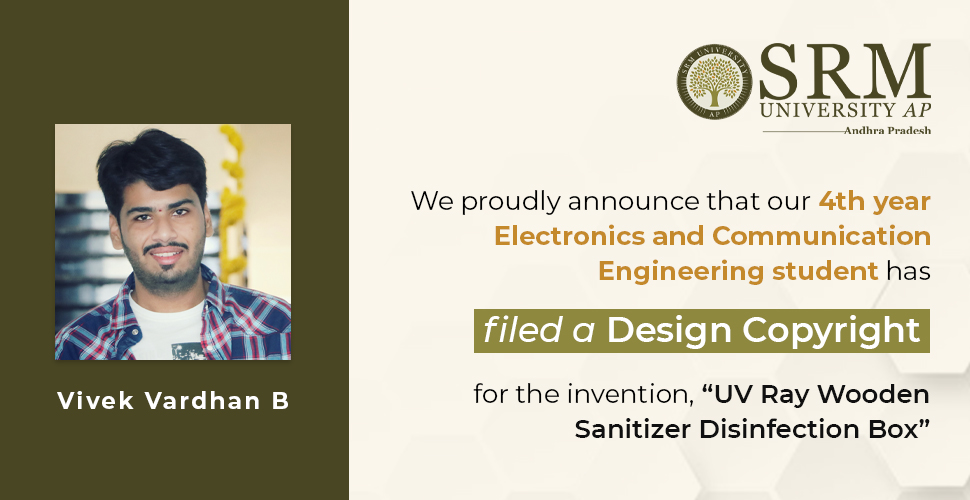 Bitragunta Vivek Vardhan, a final year student from the Department of Electronics and Communication Engineering, has filed a design copyright for developing a “UV Ray Wooden Sanitizer Disinfection Box”. This is a safe chemical-free product designed to disinfect the surfaces of items. In this period of the Covid-19 pandemic, it has been difficult to sanitize mobile phones, tabs, laptops, car/bike keys, wallets, currency/coins, credit/debit cards, newspapers, pens, goggles, spectacles, accessories, milk packets, bakery items, water-absorbing products, delivery packages, toys, clothes etc with liquid sanitisers or else with water.
Bitragunta Vivek Vardhan, a final year student from the Department of Electronics and Communication Engineering, has filed a design copyright for developing a “UV Ray Wooden Sanitizer Disinfection Box”. This is a safe chemical-free product designed to disinfect the surfaces of items. In this period of the Covid-19 pandemic, it has been difficult to sanitize mobile phones, tabs, laptops, car/bike keys, wallets, currency/coins, credit/debit cards, newspapers, pens, goggles, spectacles, accessories, milk packets, bakery items, water-absorbing products, delivery packages, toys, clothes etc with liquid sanitisers or else with water.
Researchers say that the coronavirus stays on surfaces of plastic (3-7 days), stainless steel (3-7 days), copper (up to 4 hours), paper (up to 4 days), glass (4 days), cardboard (24 hours), and wood (up to 2 days). UVC has a wavelength of 10 nm to 400 nm and is used for the disinfection method that has short-wavelength light to kill or inactivate microorganisms by destroying nucleic acids and disrupting their DNA, leaving them unable to perform vital cellular functions. The UVC light used in the product will not penetrate into solid surfaces and it is safe to use on touchscreen mobiles, laptops, tabs, etc. It is also proven that the disinfection box can destroy the bacteria and viruses on the surface of food items without causing any harm to the edibility.
“In future, I have plans to take this project to the next level by designing large dimensions of the box and making it work automatically with remote control through our mobile phone. I am extremely happy about filing the copyright and I express my heartfelt gratitude to Prof Siva Sankar Sir and Pro VC Prof D Narayana Rao Sir for giving me the opportunity and supporting me to expand my idea up to the level of implementation. And I thank Prof Vinod Kumar Sir for taking care of the filing process. Finally, I thank SRM University-AP for encouraging and nurturing young talents in all ways possible, “ Vivek stated.
- Published in Departmental News, ECE NEWS, News, Research News, Students Achievements
SRM University- AP celebrates Azadi Ka Amrut Mahotsav
 In the midst of the coronavirus pandemic, India celebrates its 75th Independence Day across the country. SRM University-AP joined the virtual celebrations through the Zoom platform at 9.00 am on August 15, 2021.
In the midst of the coronavirus pandemic, India celebrates its 75th Independence Day across the country. SRM University-AP joined the virtual celebrations through the Zoom platform at 9.00 am on August 15, 2021.
After the Flag hoisting and National Anthem which elicited patriotic fervour, the message for Independence Day was delivered by Vice-Chancellor Prof Vajja Sambasiva Rao. “The selfless sacrifice of freedom fighters has gifted us with a vibrant and strong democracy than other democratic nations. We must also take the path of selfless service and do whatever we can for the progress of our country,” Prof V S Rao said. “It is indeed our pride to say that our students are achieving greater heights through 100% placements, highly advanced research and starting their own companies through innovations”, he added. Prof D Narayana Rao, Pro-Vice-Chancellor; Ms Revathi Balakrishnan, Student Affairs Assistant Director; and Wg Cmdr Venkataachalam Sekkappan, Director-CLM; were present on the occasion. The event moved on to cultural performances by the students of the university.
India’s freedom warriors fought a long and arduous battle for the country’s independence from the British Empire. Their countless contributions and sacrifices are to be remembered forever. Commemorating the glorious lives of freedom fighters on “Azadi Ka Amrut Mahotsav”, SRM University celebrated this year’s Independence Day on the theme “Nation First, Always First.”
- Published in News


